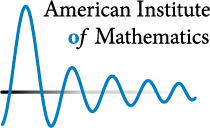
at the
American Institute of Mathematics, Palo Alto, California
organized by
Bernhard Bodmann, Gitta Kutyniok, and Tim Roemer
This workshop, sponsored by AIM and the NSF, will be devoted to outstanding problems that are in the intersection of frame theory and geometry. Frames are families of vectors in Hilbert spaces which provide stable expansions. These families are more general than orthonormal bases because they can incorporate linear dependencies. Applications in engineering, quantum theory and in pure mathematics have lead to several design problems for which optimal frames satisfy spectral as well as geometric properties. The simplest frame design problem, the construction of equal-norm Parseval frames, can be rephrased as a minimization problem on a Stiefel manifold. Similar reformulations exist for the construction of equiangular tight frames, including the special case of symmetric informationally complete positive operator-valued measures in quantum information theory. Another design problem with geometric character is that of frames for phase retrieval; these frames allow the recovery of a point in complex projective space based on the magnitudes of its frame coefficients.
Recent advances on these types of problems have incorporated more and more geometric techniques in their analysis. A strong interaction between researchers in frame theory with those in real and complex geometry, algebraic geometry and algebraic topology is expected to boost progress on these outstanding problems.
Particular topics envisioned for the workshop are the following:
The workshop will differ from typical conferences in some regards. Participants will be invited to suggest open problems and questions before the workshop begins, and these will be posted on the workshop website. These include specific problems on which there is hope of making some progress during the workshop, as well as more ambitious problems which may influence the future activity of the field. Lectures at the workshop will be focused on familiarizing the participants with the background material leading up to specific problems, and the schedule will include discussion and parallel working sessions.
The deadline to apply for support to participate in this workshop has passed.
For more information email workshops@aimath.org
Plain text announcement or brief announcement.
Go to the
American Institute of Mathematics.
Go to the
list of upcoming workshops.